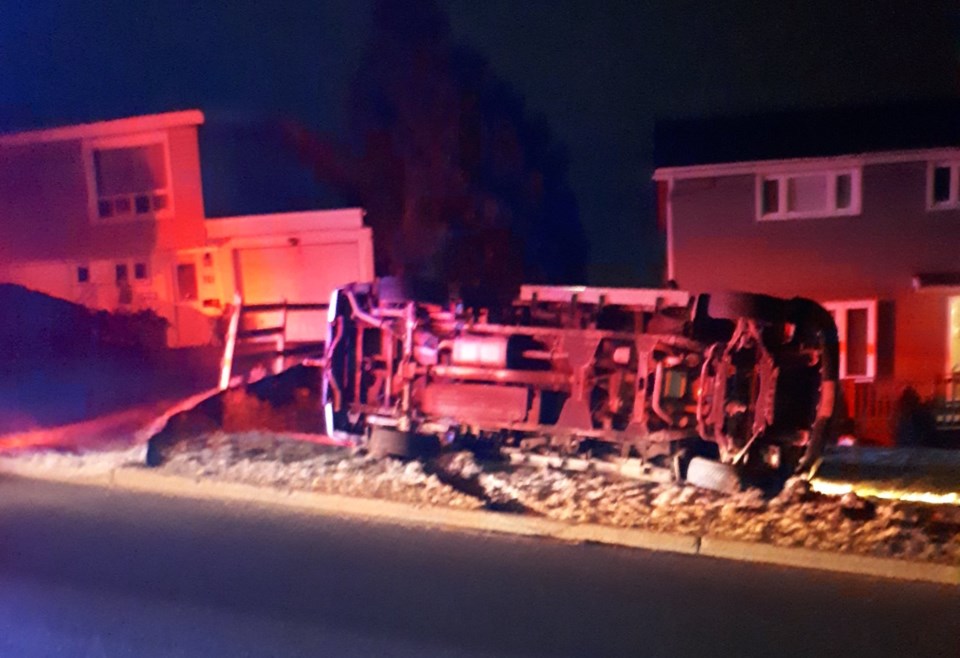A local man faces a new trial on drinking and driving charges after a Sault Ste. Marie judge overturned his acquittal in a lower court earlier this year.
The charges stemmed from an April 2018 single-vehicle accident where a truck ended up in the front yard of a Bainbridge Street residence.
Levi Laundrie, then 21, was charged with impaired driving and operating a vehicle with a blood-alcohol level exceeding the legal limit.
Last week, Superior Court Justice Michael Varpio ruled that the trial judge had failed to adequately weigh important relevant evidence and also had considered evidence that was not properly admitted at trial.
At Laundrie's trial in the Ontario Court of Justice, which took place in April 2019, and March and April of this year, the judge excluded his breath sample results after deciding his Charter right to be secure from unreasonable search and seizure had been violated by police.
The Crown appealed the acquittal. Varpio heard the matter on Oct. 20 and released his decision on Nov. 10
In his decision, he said the trial judge had excluded the samples because of a supposed Charter violation, and also had indicated he had a reasonable doubt Laundrie's ability to operate a vehicle was impaired by alcohol.
During the trial, the court heard city police were dispatched to a Bainbridge Street address at 2:38 a.m. on April 27, 2018 to investigate a suspected impaired driver.
When officers arrived, they found a pickup on its side, driver's side down, in the front yard.
It was raining and the vehicle had apparently failed to navigate a turn at the bottom of the hill.
Laundrie was standing on the vehicle.
Const. Mark Kates, who arrested the accused, testified in April 2019 that he claimed someone else had been driving the pickup and had run away, but didn't provide the name of that person.
Laundrie also admitted he was drunk so he wouldn't have been driving.
His eyes were glossy, his speech was slurred, there was a delay in answering questions and he had a strong odour of alcohol on his breath, the officer said.
Kates arrested him for impaired driving and he was taken to the station where his breath sample results exceeded the legal limit
When the voir dire - a trial within a trial to determine the admissibility of evidence - continued in March of this year Laundrie took the witness stand.
He testified that his vehicle had flipped, the airbags deployed, struck his head and left him in a state of shock.
The accused also told the court he didn't recall telling the officer he was drunk.
When he acquitted Laundrie, the trial judge said the court accepts that he had some head trauma and "it is not surprising that he would have some difficulty remembering the details of what transpired."
The observations made by Kates - the slurring of words, delays in responding to questions and glossy eyes - are consistent with a head injury that may have been caused by the accident, he said.
The Crown appealed the trial judge's acquittal, arguing that the judge had made several errors, including failing to properly consider Kates' full testimony regarding his reasonable and probable grounds for arresting the accused for impaired driving.
It also maintained that the judge's analysis regarding impairment was flawed because he considered Laundrie's voir dire evidence.
In his written decision, Varpio said the trial judge "committed palpable and overriding errors" when he found Kates' reasonable and probable grounds were limited to two things - the single-vehicle accident and the smell of alcohol on the accused's breath.
The judge effectively found that the accused's glossy eyes, slurred speech and delays in answering the officer's questions may have been related to the accident, Varpio said.
He "also failed to consider the accused's admission of drunkenness in any way as it pertained" to Kates' reasonable and probable grounds.
Varpio said the trial judge weighed Laundrie's evidence when considering the issue of impairment, but this evidence only applied to the voir dire.
"At no point did counsel ask to have Mr. Laundrie's evidence applied to the trial proceedings," Varpio noted.
The trial judge's misapprehension of the evidence constitutes a palpable and overriding error, he said.
This error requires that the acquittal be set aside and a new trial ordered, Varpio concluded.
